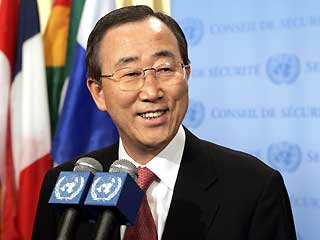Nuclear free zone in Central Asia enters into force Saturday
 New York - The first nuclear weapon free-zone in the northern hemisphere will enter into force Saturday, which calls on the five Central Asian states to forswear nuclear weapons and abandon all nuclear activities.
New York - The first nuclear weapon free-zone in the northern hemisphere will enter into force Saturday, which calls on the five Central Asian states to forswear nuclear weapons and abandon all nuclear activities.
UN Secretary General Ban Ki-moon welcomed the event, saying it is of particular significance because it encompasses a region where nuclear weapons previously existed.
The five Central Asian states are former Soviet republics widely used by Moscow for the transport and storage of nuclear material before the collapse of the Soviet Union in 1991.
"In order to ensure the effective implementation of the treaty, the secretary general would like to urge the states concerned to address any outstanding issues that may affect its operation," Ban said in a statement.
Signed by Kazakhstan, Kyrgyzstan, Tajikistan, Turkmenistan and Uzbekistan in September 2006, the Treaty on a Nuclear Weapon Free Zone in Central Asia obliges them not to conduct research, or develop, manufacture and stockpile nuclear weapons in their territories.
The Central Asian states are flanked by Russia and China, two of the world's five recognized nuclear powers. The others are the United States, France and Britain.
Those five states began talks of a nuclear free zone in 1993 and issued the Almaty Declaration in 1997 following a joint meeting.
The treaty requires the five states to comply fully with the Comprehensive Nuclear Test Ban Treaty and conclude and bring into force an additional protocol of the International Atomic Energy Agency within 18 months.
The protocol allows IAEA nuclear safeguards and its inspectors to search for undeclared nuclear material.
Other existing nuclear free zones include the 1967 Treaty for the Prohibition of Nuclear Weapons in Latin America and the Caribbean, known as the Treaty of Tlatelolco; the 1995 Treaty on the Southeast Asia Nuclear Weapon Free Zone, known as the Treaty of Bangkok; and the 1996 African Nuclear Weapon Free Zone Treaty, known as Treaty of Pelindaba. (dpa)